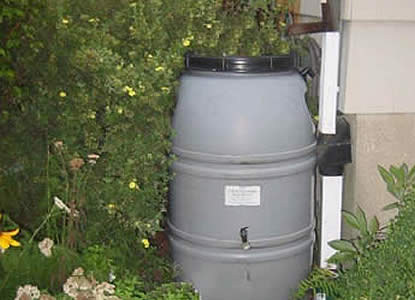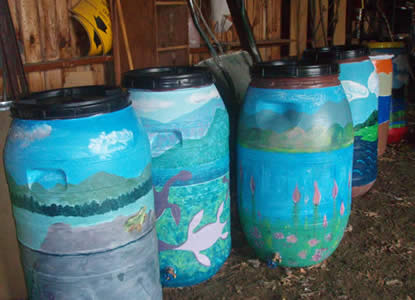Soak Up the Rain: Rain Barrels
Rain barrels capture water from a roof and hold it for later use such as on lawns, gardens or indoor plants. Collecting roof runoff in rain barrels reduces the amount of water that flows from your property. It's a great way to conserve water and it's free water for use in your landscape. Many cities and towns distribute rain barrels to residents through annual sales. Other sources include online retailers, local home and garden supply stores. Cisterns are also used to "harvest" rain water. With a greater storage capacity they may be located above or below ground.
Rainwater Harvesting, U.S. EPA Green Infrastructure
Note: Remember that as rain water flows over a roof surface it can pick up pollutants such as bacteria from birds and other animals, and chemicals from roof materials - factors to consider when thinking about using rain barrel water on edible plantings. Some links with information and suggestions are included below:
- Rain Barrels Part IV: Testing and Applying Harvested Water to Irrigate a Vegetable Garden, Rutgers, the State University of New Jersey, 2013
- The Importance of Operation and Maintenance for the Long-Term Success of Green Infrastructure, U.S. EPA, 2013
Appendix A includes information about rain barrels and cisterns.
Information About Rain Barrels
Local resources
Connecticut
A Resident's Guide to Rain Barrels in Connecticut, Rainfall as a Resource, Connecticut Department of Energy and Environmental Protection (pdf)
Fact sheet describes the benefits of using a rain barrel; how to install and maintain a rain barrel; and answers to some frequently asked questions.
Maine
Maine Stormwater Best Management Practices Manual, Maine Department of Environmental Protection
Volume III, Chapter 10 includes information about rain barrels.
Massachusetts
Rain Barrels and Other Water Conservation Tools, Massachusetts Department of Environmental Protection
Why rain barrels are important; how to install; how to make; and where to obtain a manufactured rain barrel.
New Hampshire
Rain Barrel Do-it-Yourself Fact Sheet, New Hampshire Homeowner's Guide to Stormwater Management, Do-It-Yourself Stormwater Solutions For Your Home, Soak Up the Rain New Hampshire, November 2019 (pdf)
Refer to page 39 for the Rain Barrel fact sheet with information about placing, installing, and using a rain barrel.
Rhode Island
Rain Barrels, Rhode Island Stormwater Solutions
Rain barrels and cisterns around Rhode Island, Rhode Island Stormwater Solutions
Vermont
Capture & Reuse – Rain barrels and Cisterns, Vermont Department of Environmental Conservation
Basic information along with some photos and illustrations
Absorb the Storm - Create a Rain-friendly Yard and Neighborhood, Lake Champlain Sea Grant, University of Vermont Cooperative Extension (pdf)
Discusses a number of steps homeowners can take, including rain barrels, to help prevent the problems associated with runoff.
Vermont Low Impact Development Guide for Residential and Small Sites, Vermont Department of Environmental Conservation (pdf)
Includes instructions on how to install and maintain rain barrels. Shows design guidance for double rain barrel set up.


